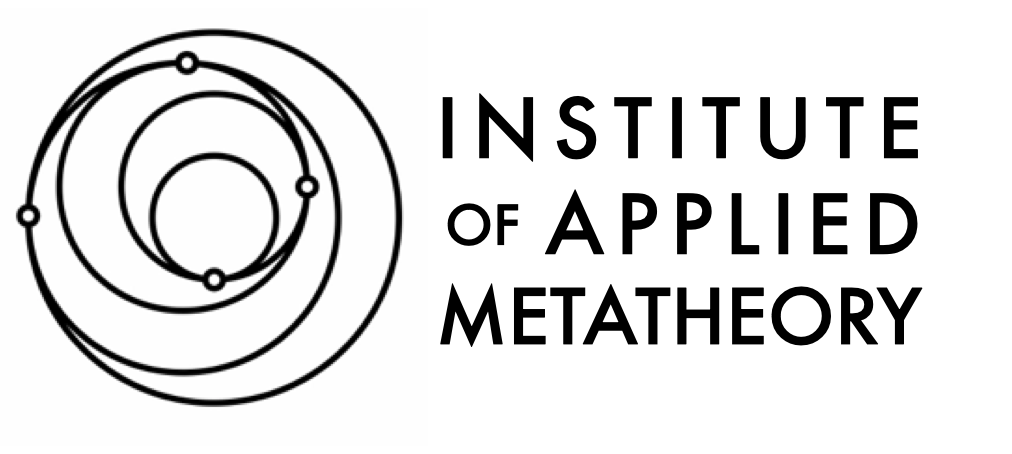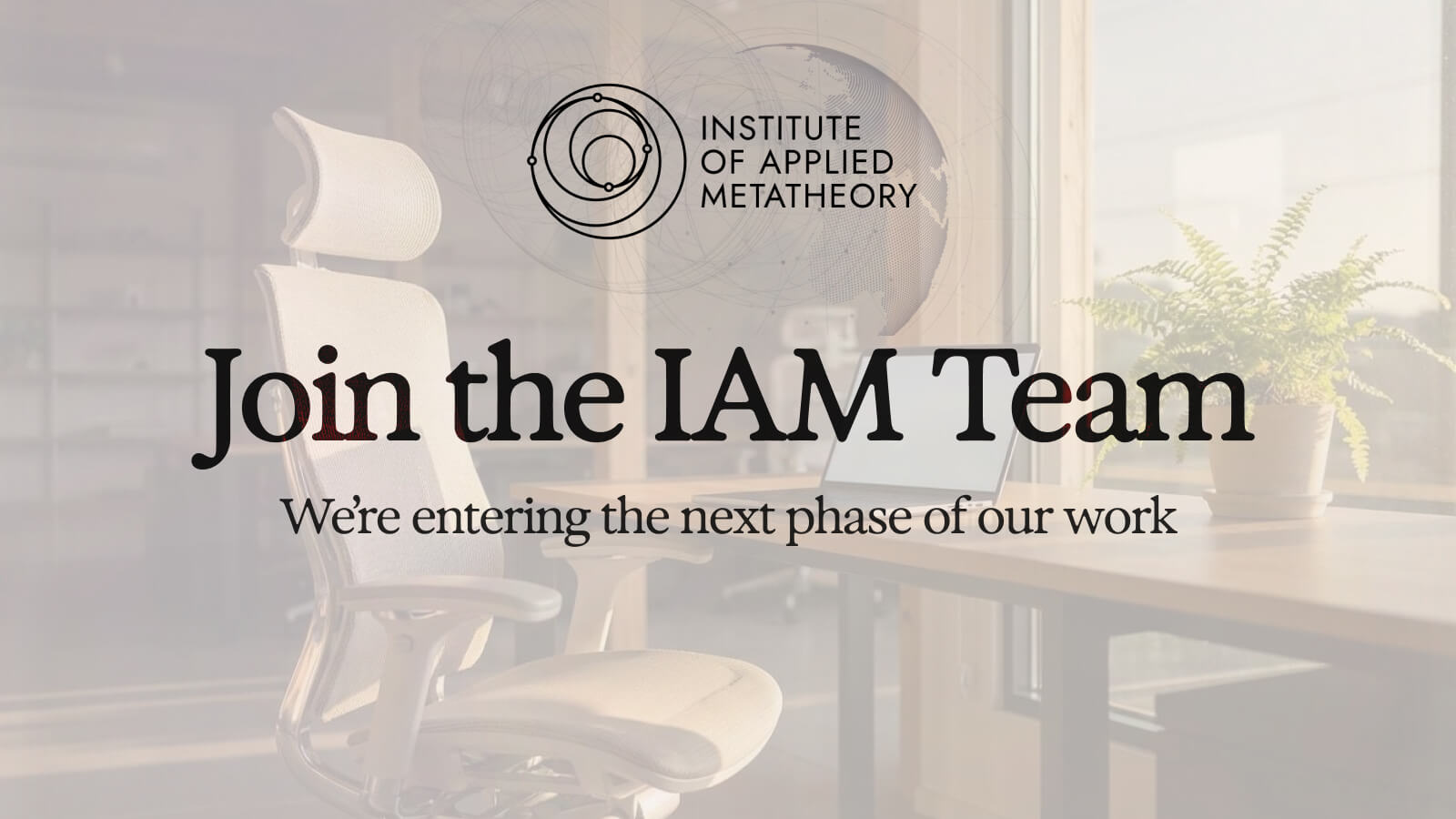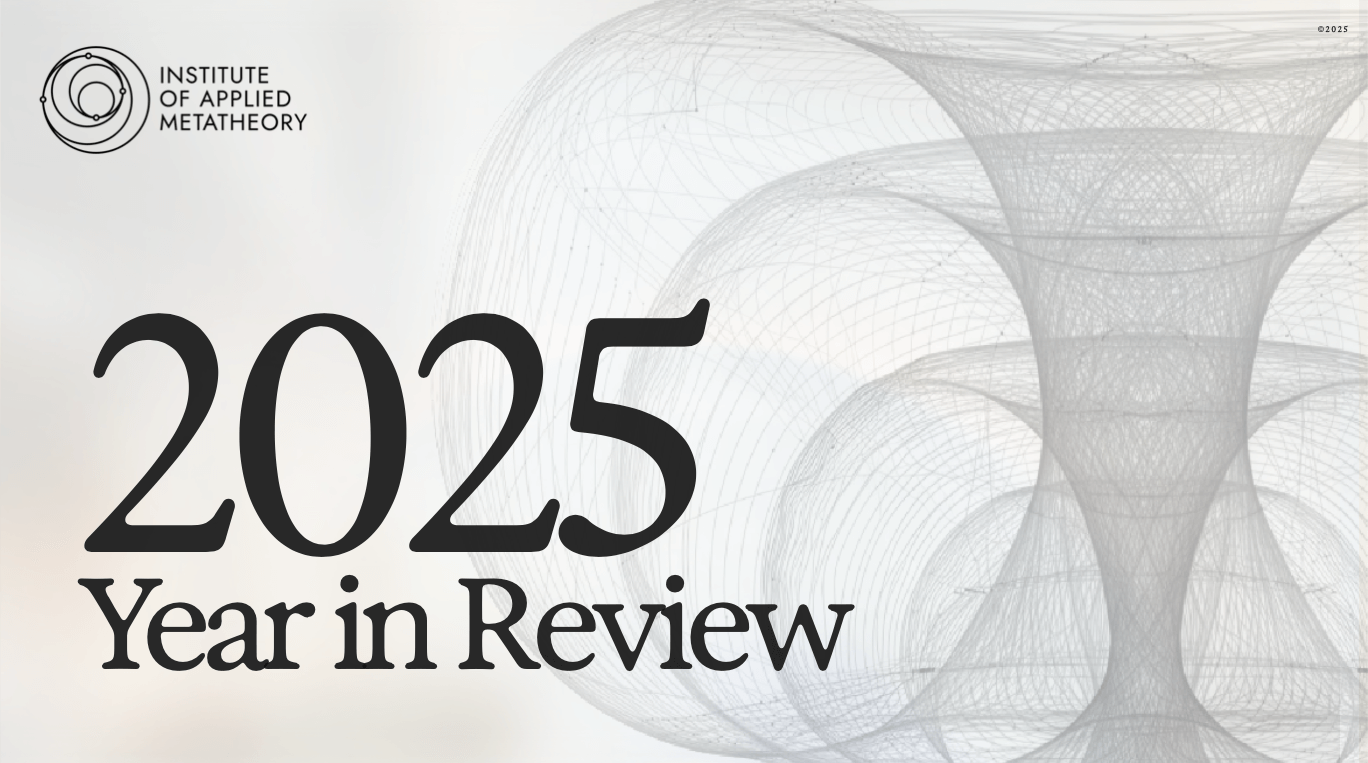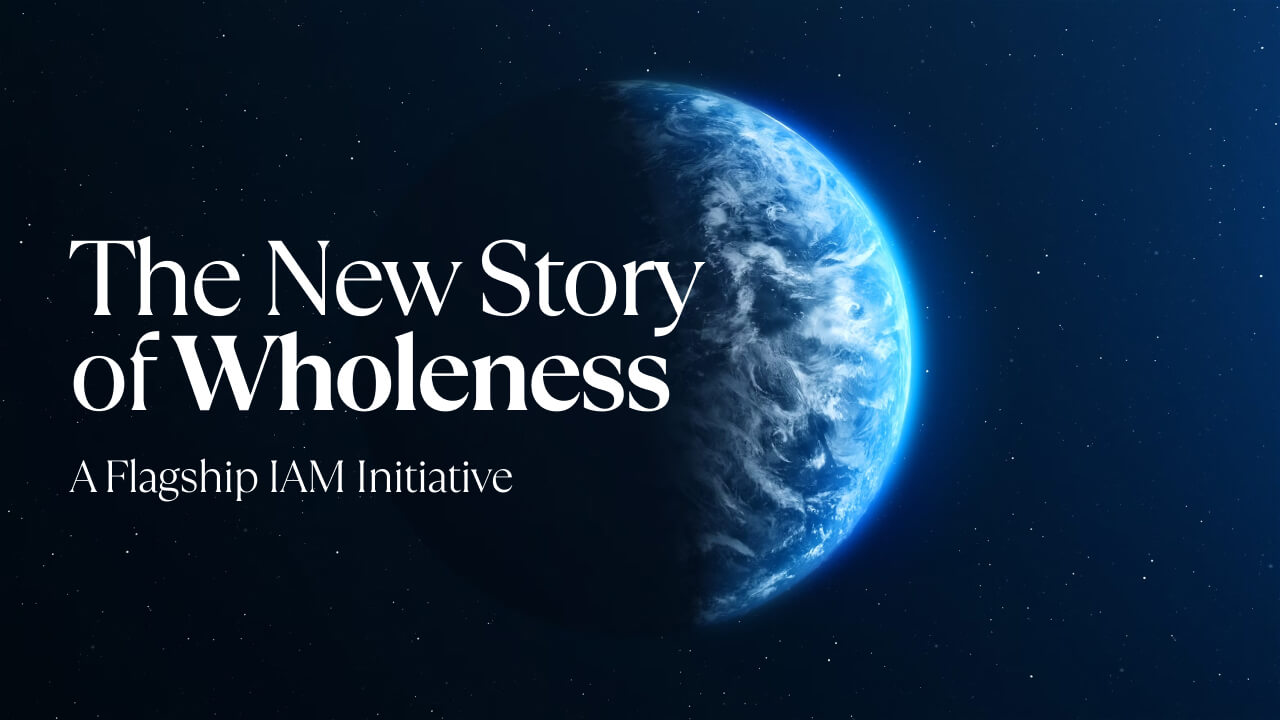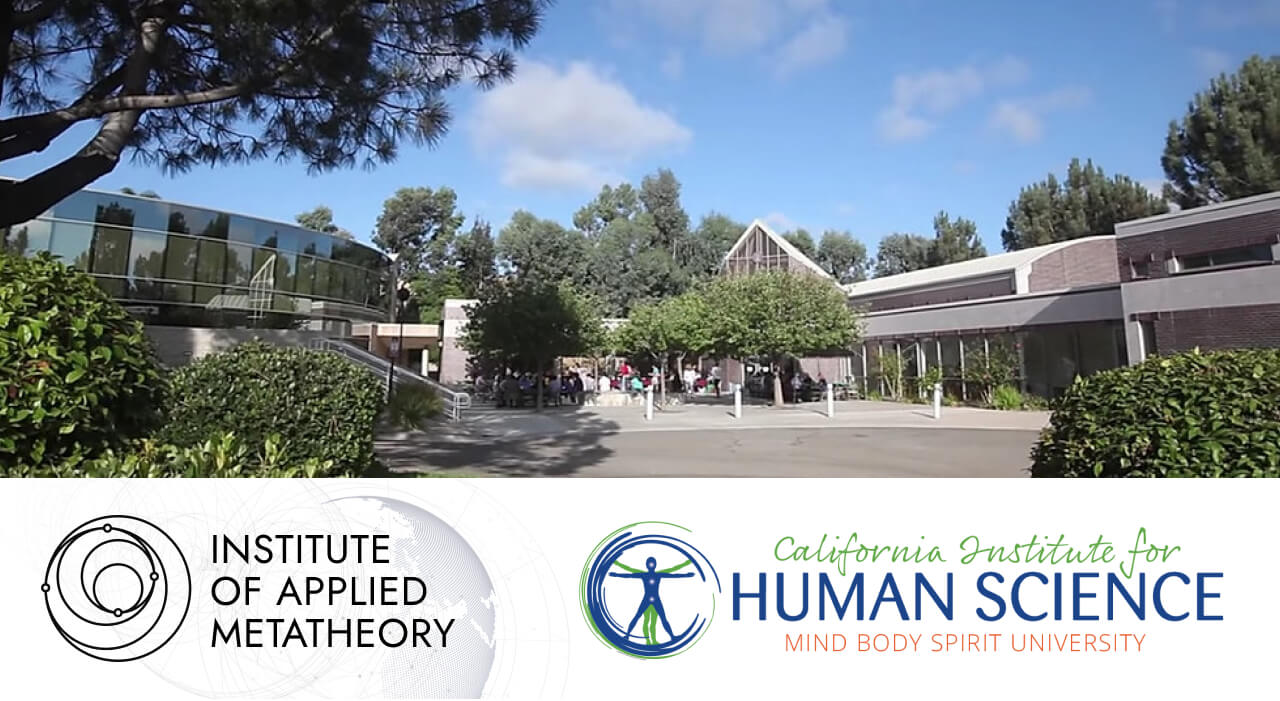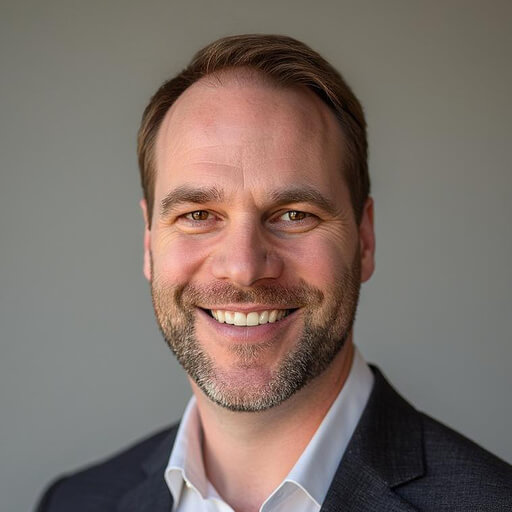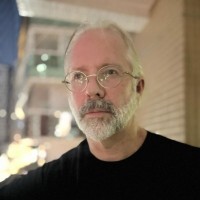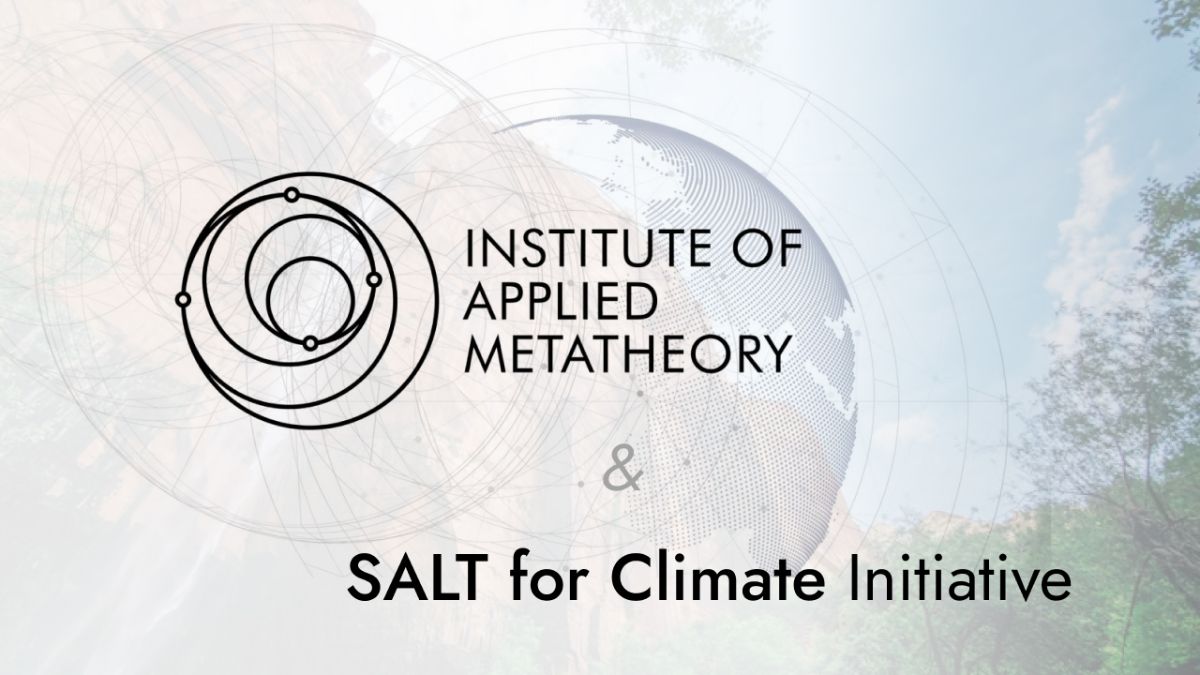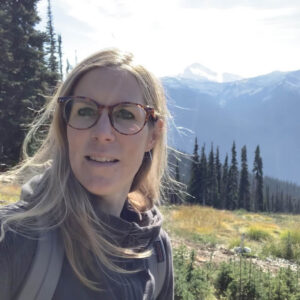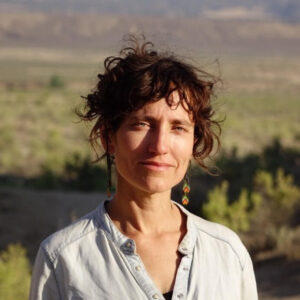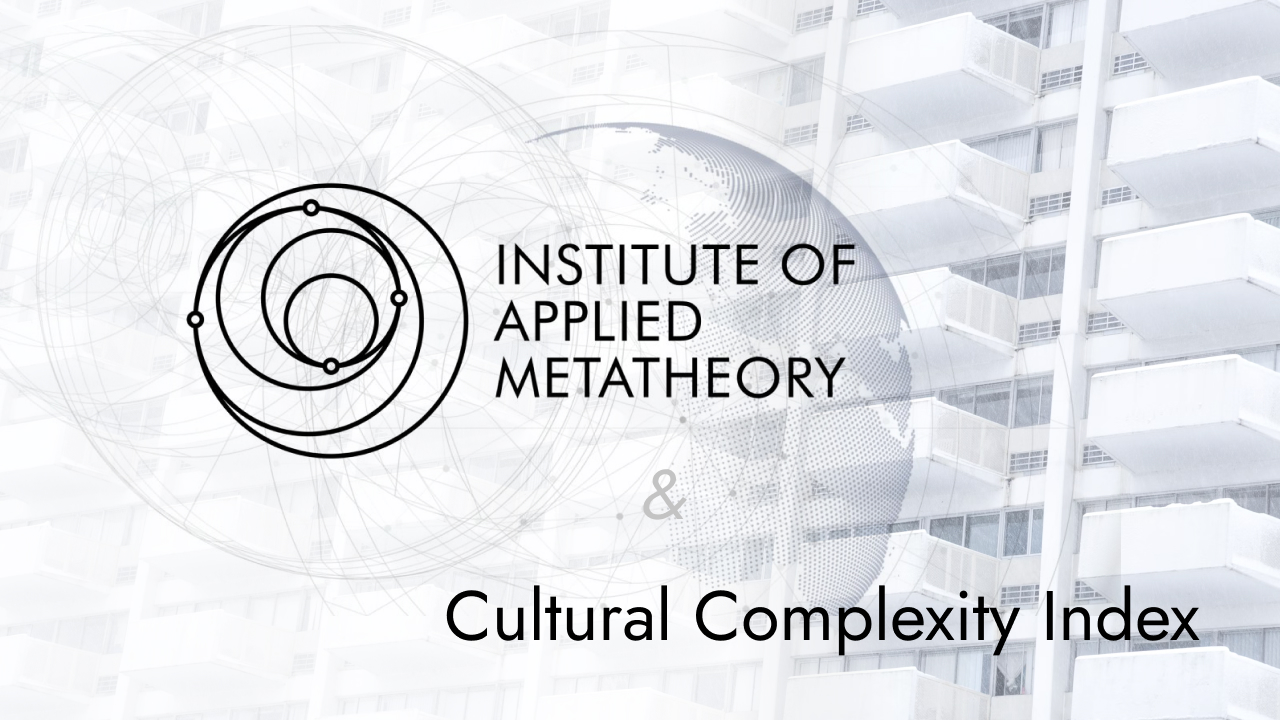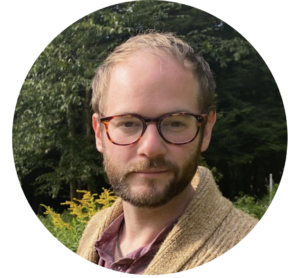Dear friends,
As we come to the close of an extraordinary year of learning, discovery and growth, I want to take this opportunity to reflect on the past twelve months and give a preview of what’s ahead for the Institute of Applied Metatheory.
IAM was formed to help meet a particular civilizational moment. Across institutions, cultures, and disciplines, we are experiencing not merely disruption, but structural transformation—the rise of what I call a “Transformation Age” characterized by global morphogenesis, and which yields and is conditioned by a powerful metacrisis (with co-arising crises in sensemaking, meaning, technoeconomy, geopolitics and ecology).
In addition to our historic context, humanity lives and labors under what can only be called broken metaphysics. Barren, small, partial and tired, our prevailing materialist and (post)modernist views of being wither in the nutrient-deprived soil in which they’re planted, in no small part driving much of the metacrisis to begin with. At the same time, a quiet revolution towards a relational, processual, valuable metaphysics of co-becoming arises—a new integrative story of differentiated, participatory wholeness. A time between worlds, yes, but also a time of many worlds: it’s a fascinating and challenging time to be alive.
Unsurprisingly, our core belief at IAM is that the primary steering challenge posed by the era is not technological capacity, economic adaptation or political will, but more integrative sensemaking and its adoptability: first, the challenge for leaders is to perceive and act within a world of accelerating complexity without simply amplifying fragmentation or accelerating the metacrisis. And second, our challenge is to help embed the knowledge and social practices of integrative sensemaking into forms that are adoptable within the constraint ecologies of global actors and institutions. IAM has a specific meta-theory of change on how to support these demands—that is, demands to adapt and adopt—and we’re investing to foster the conditions for a worldview movement to support doing so.
In 2025, several strands of IAM’s work that had been developing in parallel—philosophical, sociological, narrative, institutional, and financial—will begin to cohere into a more public-facing strategy in 2026. What unites them is a single underlying concern: how societies generate, transmit, and act from Big Pictures under conditions of accelerating complexity and pluralism.
Several questions have animated our work throughout the year:
- How do we bring the integrative worldview to life? That is, how do we incubate structures that grow to naturally socialize future generations into the freedom and fullness of integrative consciousness?
- How might integrative coherence be achieved without requiring philosophical or identity homogeneity? What constitutes a minimal integrative worldview and what context-independent constraints does it yield?
- How can we concretely deliver at the level of conditions and attractors rather than prescriptions and programs?
- How can plural, decentralized action be coordinated and emergently integrative without reverting to brittle hierarchies, charismatic movements or ideological regulation? What protocols best support integrative emergence?
- What kinds of sensemaking capacities will leaders and institutions need as adaptation cycles outpace institutional learning cycles? And how do we enable the conditions to meet leaders where they are across different constraint environments?
- How do we promote a healthy commons, ensuring generativity and decentralized impact rather than capture as integrative resources spread?
These are not abstract questions for us. They are design constraints that shape everything from our research agenda to our organizational architecture.
With all of that as our IAM’s context, below I outline our strategic agenda for 2026. And, as always, what we do is experimental, provisional and prone to high levels of ambiguity, learning and failure. We work on big, bold visions with passionate non-attachment and a bone-deep sense that at best we build sand castles; ours is a karma yoga.
First, IAM works on consolidation of an integrative philosophy kernel.
The Transformation Age needs a philosophical foundation that can meet the era on its own terms. IAM is dedicated to supporting scholars to continue refining a coherent, post-disciplinary metatheoretical foundation capable of integrating insights from systems science, meta-studies, developmental psychology, philosophy, sociology, religious studies, complexity theory and more. This work is not about novelty for its own sake, but about teasing coherence from the prior-generation integrative philosophies: a framework robust enough to hold plural perspectives without collapsing into relativism or ideology—an Integrative Philosophy 2.0. It is our view that we need institutional vehicles for asking Big Questions of Big Pictures and efficiently returning powerful, grounded replies.
To meet this mission, in 2025 IAM launched Integration: The Journal of Big Picture Theory and Practice as well as a new scholarly society. The journal addresses a gap in the intellectual ecosystem: the absence of a serious, pluralistic venue dedicated to integrative, cross-disciplinary work that “provides a scholarly home for those forging connections across domains, traditions, and levels of analysis in pursuit of deeper coherence and actionable wisdom. It is a peer-reviewed, inter-, trans-, and archdisciplinary journal committed to advancing the integrative study and applied use of metatheory and systems thinking for engaging with the unprecedented complexity of the 21st century.” The journal has put out a call for papers and is actively inviting submissions.
The journal is a central spine of IAM’s strategy to establish legitimacy and continuity for integrative philosophy and meta-studies over time. We are honored that IAM’s team approaches nearly a hundred experts across different fields, and IAM’s Integration Society has recently added more than thirty scholars from fields ranging from process philosophy and evolutionary-developmental studies to integral philosophy, metamodernism and beyond. Scholars will be showcased through a set of new podcasts and media productions, and have their work supported and socialized by a full-time in-house social media team. The society will be sponsoring monthly, quarterly and annual symposia and various working groups to generate dialogue and new knowledge.
Second, IAM works to foster worldview-producing conditions.
An important theme this year has been thinking about the Sociology of Big Pictures, which in a resulting white paper I explored what it means to organize for the rise of a worldview. This work begins from a simple but under-examined observation: societies do not function merely through policies, technologies, or incentives, but through large-scale meaning-structures that are first organized by intellectual networks that generate cultural capital and coherent semiosis from within. Networks matter, and ours has been fragmented by the same forces that characterize the “hyperreality” of late Information Age postmodernity and the pluralism-acceleration of social morphogenesis. Variety liberates, but also overwhelms individuals with a complexity gap, and overwhelms institutions as it collapses adaptive cycles to time frames that are shorter than institutional learning cycles can metabolize.
Accordingly, IAM is dedicated to supporting a broader network of integrative leaders—people who we find marked by 4 Cs: Consciousness, Curiosity, Complexity and Compassion—to see themselves as part of this novel world-historic movement in human thought and action.
To do so, IAM has formed a new Integrative Worldview Fund to fund initiatives that can support worldview productions. Over the coming years the fund, aided by IAM’s Legacy Circle, will invest millions of dollars toward the buildout of worldview infrastructure, including platforms, tools, institutions, media, and applications that support integrative sensemaking at scale. Rather than focusing narrowly on content or advocacy, the IWF targets the deeper infrastructural layers that shape how meaning circulates and becomes actionable in society.
We believe that many contemporary failures are failures of shared sensemaking at the level of worldview-scale narratives and categories, and that 4C leaders experience an inverse complexity gap throughout their lives—their interior complexity is not mirrored in the worlds they inhabit. And yet the spread of integrative thinking has a basic on-ramp problem, which is that it’s so steep that the ramp becomes a wall. To iterate on this challenge, we’re building a New Story of Wholeness as an experimental digital welcome mat for those new to integrative thinking. The New Story is not doctrine or ideology, but a public-facing narrative and lightweight educational gateway designed to make integrative patterns perceptible and inhabitable for a wider 4C audience. If it succeeds, the New Story might operate as an invitation into a way of seeing reality through a set of integrative lenses without requiring prior allegiance to any particular mode of thought. We’ll see, this is a tough one.
We have also begun a series of important projects meant to validate the contours and claims of the integrative as a worldview: the Cultural Complexity Index seeks to understand the hierarchical complexity of 5,000 years of the world’s knowledge and narrative canon and whether the integrative is a discernible emergent; the Unified Worldview Initiative seeks to explore and describe an endo-natural paradigm that can integrate and dissolve some of the hard problems of the sciences; and the Worldview Studies Initiative seeks to leverage the World Values Survey to understand “global worldview development by generating and analyzing large-scale data on the distribution of major developmental worldviews at the population level”. These initiatives are all doing groundbreaking work whose outputs are already being accepted to publish in peer-reviewed journals in their fields.
Third, IAM works to incubate and foster real-world applications of Big Picture thinking.
Individual liberation and social emancipation—the true north of an integrative worldview and IAM’s animating vision—can only ever occur when someone adopts something. And adoption of any integrative innovation or idea is downstream of context-specific constraint-compatibility. In this view, IAM’s role is not to persuade people or systems to change, but to engineer the conditions under which integrative patterns can most readily and easily be selected for in differing environments. In other words, IAM must work to make integrative social entrepreneurship legible, prestigious, fundable and survivable.
Morphogenesis will not abate anytime soon, and its disruptions create opportunity and tailwinds for integration everywhere. But to meet these opportunities requires engineering for adoption. In pluralistic, incentive-laden societies, social transformation does not occur through superior ideas or even idea networks. It occurs when new solutions engineered from those ideas become more adoptable than existing ones within specific contexts. This makes adoption of applications of Big Picture thinking constraint-limited, not insight-limited. IAM is committed to supporting emergent innovation by institutional leaders, social entrepreneurs, change engineers and cultural influencers who can translate the integrative philosophy kernel into applications that either produce feasible action inside existing adoption contexts, or alter constraints altogether (i.e., incentives, legitimacy, infrastructure) at scale.
To this end, in 2026 we will begin to experiment with a new Integrative Commons that might house Common Resource Pools (CRPs) for decentralized, open source knowledge and action accessible by anyone for anything, with no commitment or identity-gating. This reflects a core conviction of IAM: worldviews do not persist because they are true alone, but because they are embedded. If integrative perspectives are to be viable in the long run, they must be supported by durable intellectual, technological, and institutional forms.
IAM will continue to incubate institutions and applications as a first user of the commons. For example, IAM’s Faith Development Pathway is “dedicated to creating the world’s first open-access protocol for the developmental maturation of faith and ultimate concern”, with a vision of developing a full-fledged Faith Development Institute. The Strategic Metacrisis Mapping Initiative seeks to map the metacrisis and offer digital sensemaking tools for leaders across metacrisis domains to help them better understand and navigate its drivers. IAM has also been spearheading an Evolution of Philanthropy initiative, which continues to interview leaders across the philanthropic world to develop an integrative framework for helping philanthropic institutions evolve to meet the extraordinary challenges of our time. We also have domain specific initiatives incubating in policing, men’s work, AI, and more.
In closing, I’ve been asked why we started IAM in 2023 and not before. My view is limited, but for what it’s worth it didn’t seem the conditions for intellectual synthesis, the movement’s fragmentation, or the geohistoric conditions—enabling constraints all—were yet right to yield the cross-disciplinary focus needed for the integrative movement to produce at a level that is both required and we believe we can become capable (and I’ve been involved since 2006).
Only time will tell whether we can, but my confidence has grown by this third anniversary since IAM’s founding. None of this work is possible without the intellectual seriousness, financial support, and moral encouragement of those who have chosen to engage with IAM, and I remain deeply grateful to all of you who have supported IAM. This work is not fast, and it is not simple—but we believe it is necessary. Our ambition remains sober but substantial: not to win short-term attention, but to make long-term deep coherence more selectable in a fragmented world.
Thank you for being part of this shared effort to think, build, and act in alignment with humanity’s biggest and deepest pictures. Whether you have participated through dialogue, funding, engagement, or quiet attention, you are part of a shared experiment in civilizational responsibility.
With deep appreciation and unbounded love,
Happy new year to you and yours,
Robb Smith
Founder and CEO
Institute of Applied Metatheory
P.S. I thought you might enjoy this letter as a deck and so I had NotebookLM prepare an AI-generated overview for you if it was TLDR. All small mistakes are his, all big ones mine. 🙂
